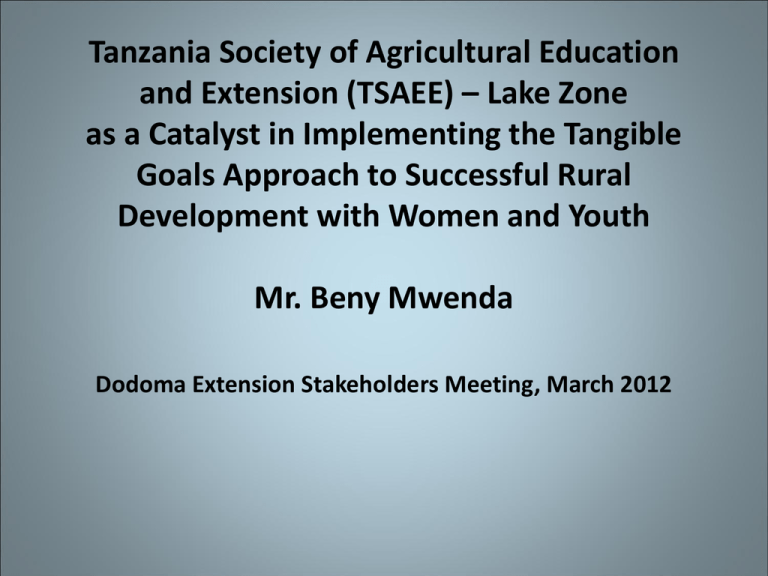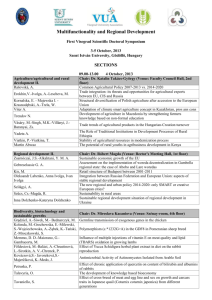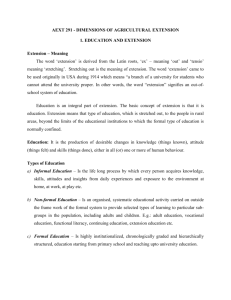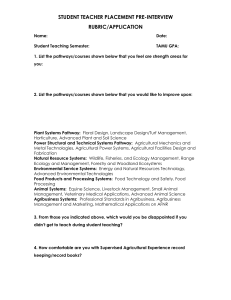Lake Zone as a Catalyst in Implementing the Tangible Goals
advertisement

Tanzania Society of Agricultural Education and Extension (TSAEE) – Lake Zone as a Catalyst in Implementing the Tangible Goals Approach to Successful Rural Development with Women and Youth Mr. Beny Mwenda Dodoma Extension Stakeholders Meeting, March 2012 Who is TSAEE? Aim and Objectives • The aim of the organization is to promote professional spirit among agricultural teachers, trainers, researchers, extension agents, managers and administrators. The objectives of the society are: 1. To provide a forum for the exchange of knowledge and ideas through scientific research, instruction, publications, meetings and other such activities. 2. To focus attention on the challenges of agricultural education and extension with a view to improving effective communication for agricultural development. 3. To review the policy and practices of agricultural education, training and extension in order to identify problems and suggest solutions. 4. To cooperate and liaise with related institutions and organizations, both national and international, in all matters of mutual interest. Lake Victoria Organizational Successes 1. Membership has grown from 7 in 2002 to 284 in 2011. 2. Inaugurated elected committees in 10 branches 3. Strategic plan, mission statement and vision. 4. National and district government recognition 5. Contracts for rural development projects 6. TSAEE model is used in extension farmer field schools 7. Geographic expansion to Western (2006) and Eastern (2008) Zones of Tanzania 8. Gender desk and environment/climate change desk established Vision of TSAEE Lake Zone In 2020, TSAEE is an efficiently-run professional organization where members can actively exchange knowledge and experiences and provide agricultural education and extension services to rural and peri-urban communities leading to rural development in Tanzania. Mission • TSAEE promotes professional spirit among qualified agricultural experts to voluntarily facilitate farmers’ initiatives to increase agricultural production and income and improve livelihood among rural and periurban farmers in Tanzania. • Dedicated members provide training, guidance, consultation and technical assistance to attain community-based participatory rural development. • TSAEE operates as a leading edge non-profit organization to advance the art and science, practices, policies and study of rural extension in Tanzania. Mission of Lake Zone TSAEE promotes professional spirit among qualified agricultural experts to voluntarily facilitate farmers’ initiatives to increase agricultural production and income and improve livelihood among rural and periurban farmers in Tanzania. Dedicated members provide training, guidance, consultation and technical assistance to attain community-based participatory rural development. TSAEE operates as a leading edge non-profit organization to advance the art and science, practices, policies and study of rural extension in Tanzania. Economic Successes 1. 2. Improved crop diversification for highest gain. Individual income growth: – – – 3. 4. 5. 6. 7. Magu: from 25,000 T/sh per month to 100,000 T/sh Ukerewe: from 15,000 T/sh per mo. to 75,000 T/sh Misungwi: from 25,000 T/sh per mo. to 60,000 T/sh Improved food availability from 2 to 3 meals per day Improved decision-making for women in household food budgeting Value of tangible goals secured by groups to date in Magu and Ukerewe totals $220,000 (CDN) Increased circulation of money in local communities through increases in capital Increased member self-employment Production Results Yield increases after training include • Paddy: 24-81% • Tomato: 40-75% • Maize: 40-100%, and • Cassava: 18-63%. BMPs 20 distinct practices such as • Improved Poultry and/or Fowl Residue Incorporation, • Drip Irrigation, • Water Use Planning, • Irrigation and Drainage Maintenance & Management, • Manure Use and Management, • Composting, • Fertilization and Fertility Management, More BMPs • • • • • • Botanical Pest and Disease Control, Proper Agro Chemical Use & Storage, Reforestation/Afforestation, Improved Stoves & Biomass Efficiency, Crop Scheduling and Rotations, Improved Spacing (Maize and Paddy), And more BMPs • • • • • • Intercropping (trees/maize, legumes/maize), Improved Seed and Variety Selection, Staking & Pruning of Vegetable Crops, Crop Establishment, Contour Cropping, Tied Ridging and Terracing. Results include: • Increased food security and food access for poor communities and particularly for those impacted by HIV/AIDS. • Rural household income increased. • Successful environmentally sustainable agricultural practices are implemented. • Women are active participants and beneficiaries of agricultural endeavours. • Formation of groups to increase the sharing of information, marketing opportunities, labour and support Methodologies • TSAEE observed that, at the conclusion of many projects coordinated by other NGOs, the rural beneficiaries and villages had little observable evidence of a project having been implemented, despite good intentions and good planning. • TSAEE wanted to participate in a project in which the rural clients could stay motivated, see the impact and results of their efforts, and gain some lasting benefits. • TSAEE designed and implemented an innovative 28 step Tangible Goals Approach Tangible Goals Approach 1. 2. 3. 4. 5. 6. Group mobilization Confirming the groups Entrepreneurship Skills Setting goals How to generate funds for achieving the goals Development and implementation of tailor made courses 7. Ongoing Mentoring, Monitoring and Evaluation




